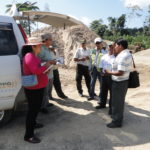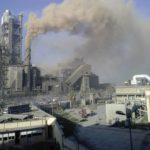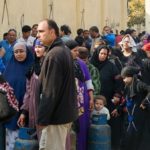This post is also available in: Arabic
Given the central role that IFIs play in shaping the development agendas in low and middle income countries, BIC seeks to amplify the voices and activities of grassroots organizations and social movements in order to ensure that people have greater influence over the development decisions that affect them and their environments, and to promote more sustainable outcomes of, and alternatives to, IFI-financed operations.
In the Middle East and Africa (MENA) Program, our main focus is on the World Bank’s operations in the MENA region in general and in the following three countries in particular: Egypt, Tunisia and Iraq. We have also done limited work in Lebanon and Morocco in the past and are looking to renew our efforts in Morocco in the coming months.
Why might civil society organizations in MENA be interested in more actively addressing the role of the World Bank?
World Bank lending to the MENA region has increased significantly in the last few years: The World Bank Group stepped up its program in the region following the global financial crisis and while its funding to the region declined as an overall rule following the Arab uprisings in 2011 because the political situation was still unclear, it has committed large amounts for the upcoming period.
“IBRD/IDA lending increased from $1.8 billion in fiscal year 2009 to $3.8 billion in FY10 then declined to $2 billion in FY11, and now stands at $1.79 billion in FY12” (World Bank website). The International Development Association (IDA), the World Bank’s fund for the poorest countries, continues to support Djibouti and Yemen, the only two countries in MENA that receive its funds. The amount of high-value knowledge services and the number of analytic and advisory products to the MENA region have also increased between 2010 and 2011. The International Finance Corporation’s (IFC), the private sector arm of the World Bank, invested $1.5 billion in the MENA region in 2011 in various sectors such as infrastructure, education and small and medium enterprises.
The Bank is ready to support governments in the region and is expecting a greater demand from them as things stabilize and countries will need assistance in urgent areas such as budgetary support, advisory services, employment-generation programs and others.
World Bank operations may not benefit those who need them most and may even cause them harm: The stated aims of World Bank financing for investment projects and policy reforms are to alleviate poverty and to promote economic development. However, ill-conceived projects and policy reforms in many regions of the world have caused widespread environmental, social and economic damage, displaced communities, and presented health risks. Many World Bank operations in MENA have failed to address the needs of the poorest communities in large part because they have been negotiated with governments which have often been non-representative, corrupt and inefficient.
Civil society groups can play a role: World Bank operations in the MENA region are often carried out without the informed participation of affected people, civil society organizations (CSOs) and – in many cases – even the legislatures of the Bank’s borrowing countries. As a result, those communities who need help the most are often not benefitting from World Bank lending and beyond that, they are sometimes negatively affected. These communities and the civil society that often works to represent their voices and needs ought to be involved from the early stages of and throughout the decision-making processes in order to mitigate the negative impacts of operations and to help guide lenders and governments as to which development projects and policies to pursue. An informed civil society is much better able to hold its government and the World Bank accountable regarding development decisions.
There are several mechanisms at the World Bank that provide spaces for civil society groups to participate in various stages of decision making processes at both the policy and project-specific level, and to ultimately influence the Bank’s involvement in their countries. In some cases, CSOs have been able to take advantage of these opportunities to push the World Bank to modify its policies, change the design or implementation of its projects, and adopt some standards to mitigate possible negative social and environmental impacts. These mechanisms, which constitute tools to ensure transparency, accountability and participation at the level of the World Bank, can also provide a forum through which civil society can engage their governments on development programs. CSOs around the world are engaging with and challenging World Bank operations in their regions. In the wake of the 2011 uprisings, Arab civil society is even keener now to be a part of the decisions which are shaping their countries economically, politically, socially and environmentally. Now it is just a matter of strategizing how to do this in the most effective way possible.
How can BIC help civil society in MENA?
BIC remains a principal source of information and strategic support to CSOs, affected communities, and grassroots movements working to address the negative side-effects of development operations. Our position in Washington, D.C., expertise with the World Bank, and networking capacity all enable us to serve as a sort of ‘ambassador’ for groups in the field so that they can more effectively represent their interests at the World Bank and achieve more equitable development outcomes. This ‘bridging’ function also allows BIC to leverage lessons learned by our partners on the ground into policy reforms at the World Bank.
BIC offers a variety of information and advocacy support services, and conducts joint activities with civil society partners, including:
- Outreach and trainings on World Bank basics, analysis and advocacy
- Dissemination of hard-to-obtain World Bank documents
- Updates on World Bank activities and impacts in select countries, sectors and policy areas
- Monitoring of problem projects and policies
- Analysis of policies and trends at the World Bank
- Advocacy support to civil society organizations interested in influencing the World Bank to promote social and economic justice
BIC has seen several achievements since its founding in 1987. Some of these include:
- Citizens today can access significantly more information about World Bank and other IFI operations than was the case a couple of decades ago. In 2009, through BIC and efforts from numerous international NGOs, the World Bank revised its information disclosure policy to significantly expand civil society access to development information and Bank decision-making. Given the World Bank’s influence in the development field, the African Development Bank and the Inter-American Development Bank followed suit with very similar policies soon afterwards.
- BIC worked with other civil society groups to help establish the World Bank Inspection Panel in 1993. The Inspection Panel provides a forum for people who believe that they may be adversely affected by Bank-financed operations, by bringing their concerns to the highest decision-making levels of the World Bank. The Panel determines whether the Bank is complying with its own policies and procedures, which are designed to ensure that Bank-financed operations provide social and environmental benefits and avoid harm to people and the environment.
- BIC and other U.S. based environmental NGOs helped secure the passage of the Pelosi Amendment, which requires the World Bank and all the regional multilateral development banks that the US co-funds to review the potential environmental impacts of their development projects and to make these environmental assessments publicly available.
- Environmental and social safeguard policies provide guidelines for staff at the Bank and borrower governments in the identification, preparation, and implementation of programs and projects. BIC has worked over the years to strengthen these policies across the IFIs, resulting in several improvements in policies such as those relating to involuntary resettlement and the protection of indigenous peoples’ rights. BIC continues to advocate for stronger environmental and social safeguards.
- BIC helped facilitate the creation of IFI watcher networks in World Bank regions across the globe; prominent examples include the FORUM on the Asian Development Bank (ADB) in Manila, the CEE Bankwatch Network in Prague, and played a key role in setting up the African-led Coalition on the African Development Bank.
- BIC has been central in civil society efforts to stop or reform particularly problematic projects financed by the IFIs. These include the Phulbari Coal Project in Bangladesh, the Eskom plant in South Africa, the Chad-Cameroon pipeline, the Bujugali dam in Uganda, several infrastructure projects in the Amazon region, and the Yemen Institutional Development Policy Grant, among several others.
Click below for further information on current and past programmatic activities in MENA:
News and Updates
 BIC Rebuttal to the World Bank’s Response to BIC’s case studies on Development Policy Operations in Peru, Egypt, Mozambique, and Indonesia
BIC Rebuttal to the World Bank’s Response to BIC’s case studies on Development Policy Operations in Peru, Egypt, Mozambique, and IndonesiaThis post is also available in: ArabicBIC Rebuttal to the World Bank’s Response...
 Publication: BIC launches new manual for community-led project monitoring
Publication: BIC launches new manual for community-led project monitoringThis post is also available in: ArabicThe risks associated with development proj...
 Tools for community-led project monitoring: Documentation and verification of impacts in the Titan Cement project
Tools for community-led project monitoring: Documentation and verification of impacts in the Titan Cement projectThis post is also available in: ArabicWhen a community faces negative impacts du...
 Tools for community-led project monitoring: Community surveys in Egypt
Tools for community-led project monitoring: Community surveys in EgyptThis post is also available in: ArabicCommunity surveys can be a useful tool for...
